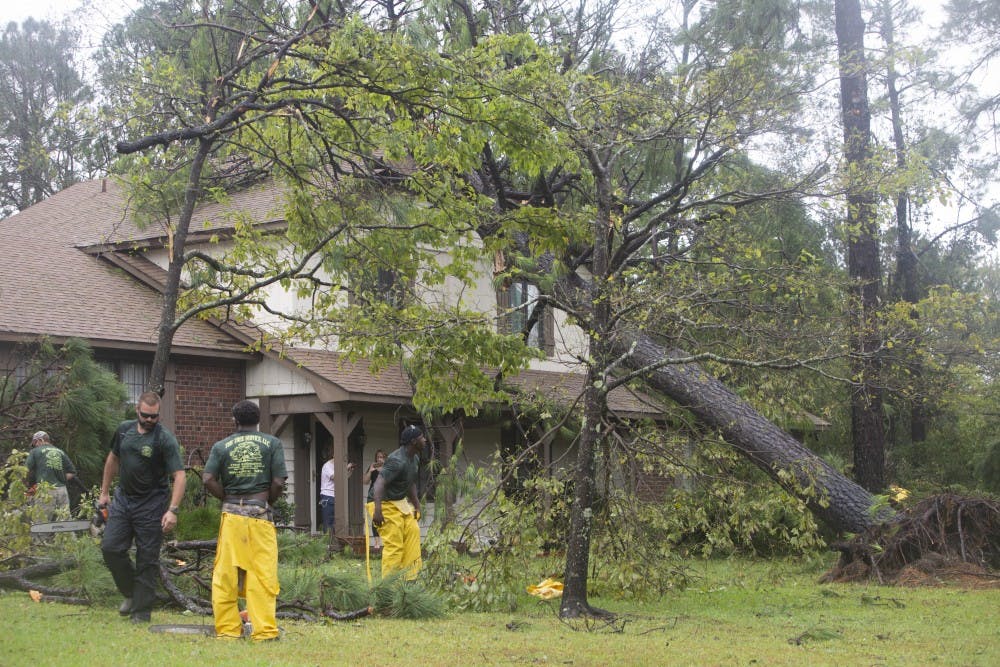For Méndez, the storm made the fall semester of her sophomore year one of the busiest of her life. She completed her transfer application, but her schoolwork had been pushed back, and it interfered with her ability to apply for research positions during the summer.
“We ended up taking finals during Christmas-time, and we had to take classes all throughout December,” she said. “I remember I was studying on New Year’s Eve and Christmas Eve, and all of that got in the way.”
A year later, Méndez said she is happy here at UNC, but her family is still dealing with a leaky roof and broken doors that she said will not be fixed anytime soon.
“We actually have thousands of dollars in repairs to be done, but our insurance still hasn’t paid a cent so we actually haven’t been able to repair anything,” she said. “If another hurricane were to pass, the same thing would happen.”
Lissie
First-year Lissie Rivera had just been through a milder hurricane, Irma, weeks before Maria hit, so the devastation took her and her family by surprise.
“We weren’t expecting it to be that bad so we didn’t even refill the gas and everything,” she said. “So we were stuck in the house for like two weeks, my sister, my mom and me, and we couldn’t communicate because we had no signal. In our whole town, we couldn’t find any signal for at least a month.”
The eye of the storm tore through Rivera’s rural town of Aguas Buenas, and although her house escaped with minimal damage, Maria stripped the land of its forests and left many areas flooded.
“Going in a car and seeing everything later, it was not good,” she said. “I think like 25 percent of our residents lost their houses.”
Like Méndez, Rivera was also applying to UNC during this time. But without power, Rivera said she had to go to a fast food restaurant called El Meson to get on the internet and complete her application.
“I left (El Meson) at like 11 every day,” she said. “That was like my life-saver. I spent most of my time there during October and November.”
Hurricane Maria convinced Rivera she was right to want to leave Puerto Rico, but she said she hopes someday she can come back to improve the island in some form.
To get the day's news and headlines in your inbox each morning, sign up for our email newsletters.
“I’ve always felt the responsibility to get out of Puerto Rico to see how I can help them when I go back,” she said.
Jorge
Jorge Santana hadn’t planned on leaving Puerto Rico before Maria. He had planned to finish his bachelor’s degree at the University of Puerto Rico at Rio Piedras and then come to the United States for a graduate degree.
Santana said the price of tuition at his university had risen dramatically right before Maria, and that combined with the damage of the storm made the decision easy for him.
“You don’t know when the power’s going to go out, when another hurricane is going to hit, and the political instability of the university was a big concern for me,” he said.
Maria was one of the reasons Santana decided to leave Puerto Rico, but despite this, Santana said he is proud of his country.
“I love my island. It’s my home,” he said “I grew up there, was raised there, studied there. Basically this is my first time living here in the states. I think it’s more calm here, it feels safe, but home is where family is.”
These three Puerto Rican UNC students make up a portion of the nearly 500,000 people that have fled the island for the mainland United States in the past decade. However, some Puerto Rican students and professors did not leave, and instead were left to cope with the damages on the island.
Professor Wendy Matos at the University of Puerto Rico, Medical Sciences campus, saw firsthand how the hurricane affected her students.
“Some did not return, the impact was terrible,” she said. “The storm destroyed their houses, destroyed their families. Not a lot, but there were some that did not return.”
She was not spared from harm. A year later, she is still not back in her apartment because of the damage the hurricane caused.
“I have an apartment on the 26th floor and it exploded, all the windows were blown out; it was very tough,” she said.
During the storm, Matos said her university tried to support students and faculty alike by providing services to support them.
“We had food for the students, we had different activities to help them with food, with clothes with everything,” she said. “We also had counseling and mental health programs that they benefited from,”
Looking back, Santana said things could have been handled better, but he is confident that Puerto Ricans will get back on their feet soon.
“We’re a little bit of an oxymoron,” he said. “We dwell on things, but at the same time get over stuff quickly. I think we’ll definitely be more cautious in terms of when storms come up.”
Reflecting on the recent damage caused by Hurricane Florence, Santana said it is ironic that he escaped one hurricane only to be caught in another.
“I feel like hurricanes follow me."
@marcoquiroz10
university@dailytarheel.com




